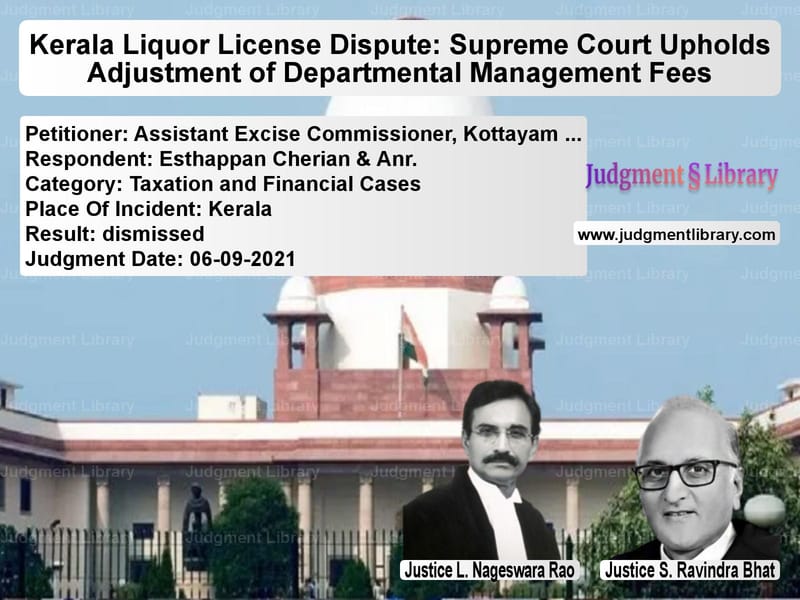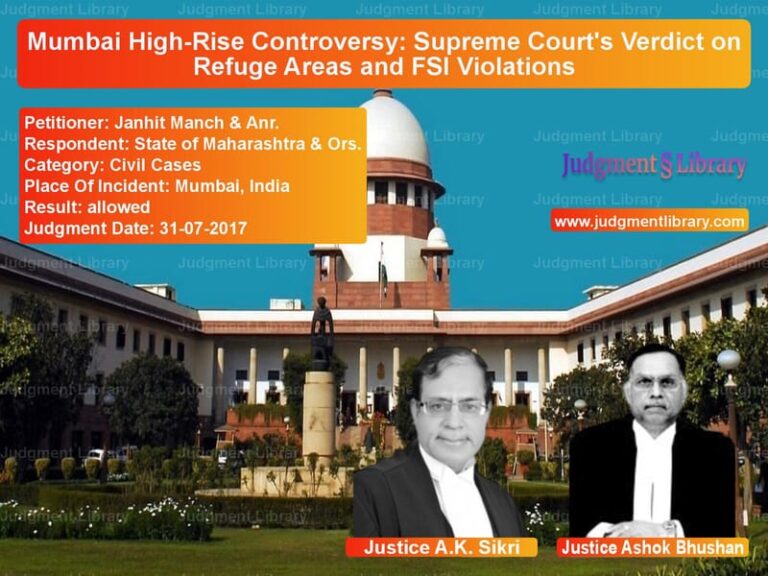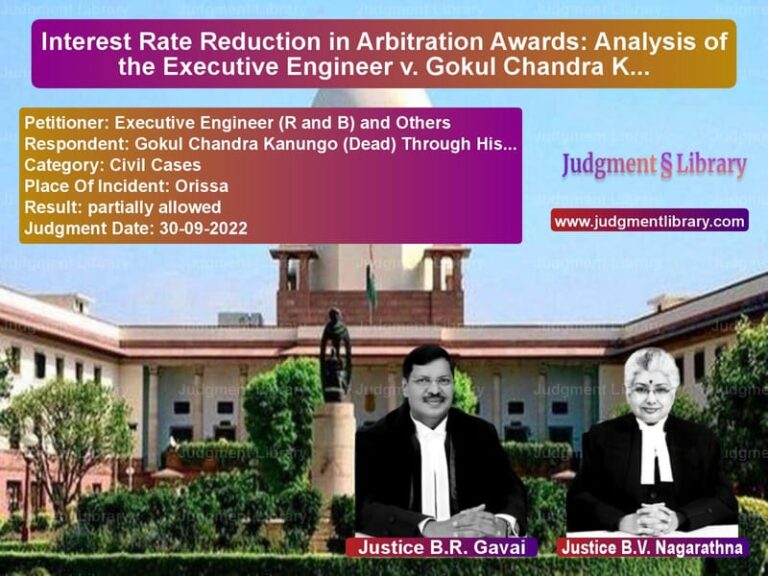Kerala Liquor License Dispute: Supreme Court Upholds Adjustment of Departmental Management Fees
The case of Assistant Excise Commissioner, Kottayam & Ors. v. Esthappan Cherian & Anr. involves a long-standing dispute over liquor licensing in Kerala. The case primarily concerns whether the State of Kerala could demand full payment from a liquor vendor whose license was canceled, even though the state managed the liquor shops and collected revenue afterward. The Supreme Court had to determine whether the departmental management fee collected by the state should be credited to the vendor’s liabilities.
Background of the Case
The respondent, Esthappan Cherian, was the successful bidder for the license to run arrack shops in Kerala for the financial year 1993-94. He was awarded a permit for importing 13,00,920 litres of rectified spirit and was required to pay excise duty of ₹3,58,162 per month. The total bid amount was ₹60 lakhs, and he signed an agreement with the Kerala Excise Department on April 1, 1993.
However, the state alleged that the licensee defaulted on payments and failed to replenish his security deposit. A show cause notice was issued on July 23, 1993, and subsequently, the license was canceled on August 19, 1993. The government then attempted to re-auction the shops but failed to secure new bidders. Consequently, the state took over the liquor shops and operated them under the Abkari Shops Departmental Management Rules, 1972.
Key Issues in the Case
- Whether the government could demand the full contract value from the licensee despite managing the liquor shops and collecting revenue.
- Whether the amended Rule 13 of the Abkari Shops Departmental Management Rules, introduced in December 1993, applied retrospectively.
- Whether the departmental management fees collected by the state should be credited toward the vendor’s outstanding dues.
- Whether the licensee was entitled to relief under the 2008 and 2011 Amnesty Schemes for liquor license arrears.
Arguments by the State of Kerala
The State contended that:
- The licensee had failed to pay his kist (license fee) and replenish his security deposit, justifying the cancellation of his license.
- Under the amended Rule 13, which came into effect on December 23, 1993, any departmental management fees collected were not adjustable against the vendor’s outstanding dues.
- Had the licensee continued operations, he would have generated revenue amounting to ₹1,09,87,989. The state, therefore, demanded the balance amount from him.
- The licensee was liable for over ₹77,65,189 plus 18% interest per annum.
Arguments by the Respondent (Licensee)
The licensee countered that:
- The contract was signed in April 1993, and his license was canceled in August 1993, before the new Rule 13 came into force. Hence, the amended rule could not apply retrospectively.
- The government collected revenue from running the liquor shops after canceling his license, and that revenue should be adjusted against his dues.
- The Division Bench of the Kerala High Court had correctly held in Lucka v. State of Kerala that the amended rule did not apply to licenses granted before December 1993.
- The government rejected his applications under the 2008 and 2011 Amnesty Schemes despite his willingness to settle the matter.
Supreme Court’s Analysis
The Supreme Court, comprising Justices L. Nageswara Rao and S. Ravindra Bhat, analyzed whether the state was justified in refusing to adjust the departmental management fees against the licensee’s dues.
Key Findings
- Rule 13 Could Not Be Applied Retrospectively: The Supreme Court held that laws cannot be applied to past transactions unless explicitly stated. The licensee’s contract was signed before the rule was amended, so he was entitled to adjustments.
- State Collected Revenue and Must Credit It: The government ran the liquor shops after canceling the license and collected ₹14,94,570 as departmental management fees and ₹16,59,771 as excise duty. The Court ruled that these amounts must be credited against the licensee’s outstanding dues.
- Licensee Entitled to Amnesty Scheme Benefits: The Court observed that the state unfairly rejected the licensee’s applications under the amnesty schemes. Since the Kerala government had auctioned his property to recover dues, it was obligated to consider amnesty benefits.
Key Observations by the Supreme Court
“In the absence of a clear legislative intent, a rule or law cannot be construed as retrospective. The amendment to Rule 13, which came into force in December 1993, cannot govern contracts that were entered into before that date.”
“The state had collected revenue from departmental management of the liquor shops. That amount must be credited to the licensee’s dues, as he cannot be made liable for losses that the state did not actually incur.”
Final Judgment
The Supreme Court ruled:
- The Kerala High Court’s decision in favor of the licensee was upheld.
- The state must adjust the revenue collected during its management of the shops.
- The licensee’s liability was reduced to ₹40,51,288, and he was directed to pay 50% of this amount within two months.
- The Kerala government was ordered to release the licensee’s attached property upon receiving the final payment.
- No further interest or penalties could be imposed on the licensee.
Implications of the Judgment
This ruling has significant implications:
- Government Cannot Demand Excessive Dues: The state cannot demand the full contract value when it has already collected revenue from managing the business.
- Retrospective Application of Rules Limited: The judgment clarifies that amended rules cannot be applied retroactively unless explicitly stated.
- Fair Treatment for License Holders: Liquor vendors and other licensees must be treated fairly, with due credit given for revenues collected by the state.
Conclusion
The Supreme Court’s ruling in Assistant Excise Commissioner v. Esthappan Cherian is a landmark decision ensuring fairness in government contracts. By upholding the Kerala High Court’s ruling, the Supreme Court prevented the state from unjustly enriching itself and reaffirmed that legal amendments cannot be applied retrospectively without clear legislative intent. This judgment serves as an important precedent in cases involving government contracts and licensing disputes.
Petitioner Name: Assistant Excise Commissioner, Kottayam & Ors..Respondent Name: Esthappan Cherian & Anr..Judgment By: Justice L. Nageswara Rao, Justice S. Ravindra Bhat.Place Of Incident: Kerala.Judgment Date: 06-09-2021.
Don’t miss out on the full details! Download the complete judgment in PDF format below and gain valuable insights instantly!
Download Judgment: assistant-excise-com-vs-esthappan-cherian-&-supreme-court-of-india-judgment-dated-06-09-2021.pdf
Directly Download Judgment: Directly download this Judgment
See all petitions in Tax Refund Disputes
See all petitions in Judgment by L. Nageswara Rao
See all petitions in Judgment by S Ravindra Bhat
See all petitions in dismissed
See all petitions in supreme court of India judgments September 2021
See all petitions in 2021 judgments
See all posts in Taxation and Financial Cases Category
See all allowed petitions in Taxation and Financial Cases Category
See all Dismissed petitions in Taxation and Financial Cases Category
See all partially allowed petitions in Taxation and Financial Cases Category







